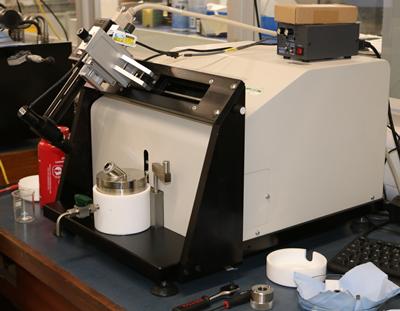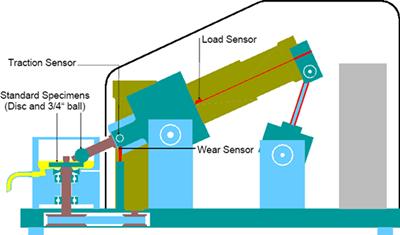Overview
Projects
MTM 3D-SLIM
Specifications
One of the main applications is the fully automated traction mapping of lubricants under conditions commonly found in internal combustion engines. Additional features allow the measurement of anti-wear additive film growth on test specimens, investigation of soft contacts, reciprocating friction and wear measurements.

In the standard configuration the test specimens are a 19.05mm (3/4″) steel ball and a 46mm diameter steel disc. The ball is loaded against the face of the disc and the ball and disc are driven independently to create a mixed rolling/sliding contact. The frictional force between the ball and disc is measured by a force transducer. Additional sensors measure the applied load and the lubricant temperature.

Projects within nCATS includes investigation nanoparticle additives and their formation tribofilms.
Below is a list of projects undertaken on the MTM:
- Effects of vitamin E and natural lubricants on wear and oxidation of ultra-high molecular weight polyethylene (UHMWPE): to understand how this may be affected by the antioxidant molecule alpha tocopherol (vitamin E) when it is incorporated in the matrix of UHMWPE.
- WS2 as lubricant nanoadditives: WS2 nanoparticles possess remarkable tribological and physicochemical properties which recommend them as potential candidates for replacing problematic additives still in use in lubricants.
- Polymer lubrication: Polymers and polymer-based composites are increasingly becoming preferred materials and coatings for green tribology because of the combination of good mechanical and tribological properties, resistance to corrosion and chemicals, lightweight, reduced noise and maintenance costs.
Papers generated using the MTM:
- Tungsten dichalcogenide lubricant nanoadditives for demanding applications
- Mechanism of oil-lubrication of PEEK and its composites with steel counterparts
- Effect of organic friction modifiers on lubrication of PEEK-steel contact
- Effect of lubrication on friction and wear properties of PEEK with steel counterparts
The 3D spacer layer imaging (3D-SLIM) option uses optical interferometry to measure sub-micron additive films on the specimens as they form during the test. To make the measurement the steel test ball is loaded against a glass disc coated with a chromium and silica layer. The contact is illuminated by a white light source directed down a microscope and through the glass disc.
Part of the light is reflected from the chrome layer on the disc and part travels through the silica layer and any additive film and is reflected back from the steel ball. The recombining light paths form an interference image which is focused onto the imager of a high resolution RGB camera. The camera image is captured by a digital frame grabber and can be analysed by the control software to determine a film thickness map of the contact.
To perform the test the steel ball is loaded against the steel disc and run under mixed sliding/rolling conditions for a fixed duration. Periodically throughout the test, the ball is stopped, loaded in reverse against the glass disc and a film thickness map of the complete contact area is taken. This allows film thickness measurements to be taken of any reaction films as they form. When used in tandem with the friction measurement, this provides a full, real time picture of both the chemical and physical effects of the films formed in the contact.
MTM Specifications:
| Attribute | Range/Value |
|---|---|
| Load Range: | 0 to 75 N |
| Contact Pressure: | 0 to 1.25GPa (3.1 GPa with alternative specimens) |
| Speed: | -4 to 4 m/s |
| Temperature Range: | up to 150°C |
| Test Sample Volume: | 35 ml |
| Power supply: | 100-240V, 50/60 Hz, 750 VA |